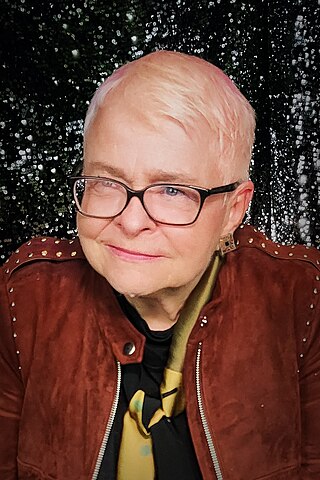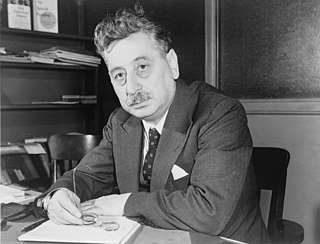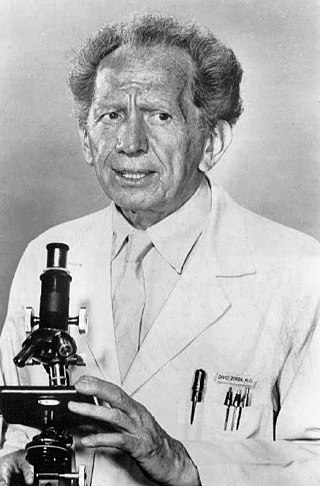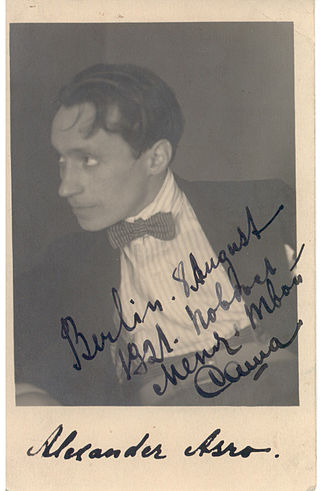Related Research Articles

Tevye the Dairyman, also translated as Tevye the Milkman is the fictional narrator and protagonist of a series of short stories by Sholem Aleichem, and their various adaptations, the most famous being the 1964 stage musical Fiddler on the Roof and its 1971 film adaptation. Tevye is a pious Jewish dairyman living in the Russian Empire, the patriarch of a family including several troublesome daughters. The village of Boyberik, where the stories are set, is based on the town of Boyarka, Ukraine, then part of the Russian Empire. Boyberik is a suburb of Yehupetz, where most of Tevye's customers live.

Fiddler on the Roof is a musical with music by Jerry Bock, lyrics by Sheldon Harnick, and book by Joseph Stein, set in the Pale of Settlement of Imperial Russia in or around 1905. It is based on Tevye and his Daughters and other tales by Sholem Aleichem. The story centers on Tevye, a milkman in the village of Anatevka, who attempts to maintain his Jewish religious and cultural traditions as outside influences encroach upon his family's lives. He must cope with the strong-willed actions of his three older daughters who wish to marry for love; their choices of husbands are successively less palatable for Tevye. An edict of the tsar eventually evicts the Jews from their village.

Solomon Naumovich Rabinovich, better known under his pen name Sholem Aleichem, was a Yiddish author and playwright who lived in the Russian Empire and in the United States. The 1964 musical Fiddler on the Roof, based on Aleichem's stories about Tevye the Dairyman, was the first commercially successful English-language stage production about Jewish life in Eastern Europe.

Donald Margulies is an American playwright and academic. In 2000, he won the Pulitzer Prize for Drama for his play Dinner with Friends.

Paula Vogel is an American playwright. She is known for her provocative explorations of complex social and political issues. Much of her work delves into themes of psychological trauma, abuse, and the complexities of human relationships. She has received the Pulitzer Prize as well as nominations for two Tony Awards. In 2013 she was inducted into the American Theatre Hall of Fame.

Sholem Asch, also written Shalom Ash, was a Polish-Jewish novelist, dramatist, and essayist in the Yiddish language who settled in the United States.

Shalom "Sam" Jaffe was an American actor, teacher, musician, and engineer. In 1951, he was nominated for the Academy Award for Best Supporting Actor for his performance in The Asphalt Jungle (1950). He also appeared in The Day the Earth Stood Still (1951) and Ben-Hur (1959), and is additionally known for his roles as the titular character in Gunga Din (1939) and as the "High Lama" in Lost Horizon (1937).
The Vilna Troupe, also known as Fareyn Fun Yiddishe Dramatishe Artistn and later Dramă şi Comedie, was an international and mostly Yiddish-speaking theatre, one of the most famous in the history of Yiddish theater. It was formed in and named after the city of Vilnius (Vilna) in the Russian Empire, later capital city of Lithuania. Distinctly Modernist, and strongly influenced by Russian literature and by the ideas of Konstantin Stanislavski, their travels in Western Europe and later to Romania played a significant role in the dissemination of a disciplined approach to acting that continues to be influential in the present day.

David Kessler (1860–1920) was a prominent actor in the first great era of Yiddish theater. As a star Yiddish dramatic performer in New York City, he was the first leading man in Yiddish theater to dispense with incidental music.

Yiddish literature encompasses all those belles-lettres written in Yiddish, the language of Ashkenazic Jewry which is related to Middle High German. The history of Yiddish, with its roots in central Europe and locus for centuries in Eastern Europe, is evident in its literature.

Alexander Asro was a film and theatre actor. He was a member of the Vilna Troupe and appeared in several comedic films in the United States.

Zwi Migdal was a criminal organisation founded by Jews in Poland in the 19th century, based mainly in Argentina.
Joachim Neugroschel was a multilingual literary translator of French, German, Italian, Russian, and Yiddish. He was also an art critic, editor, and publisher.
Nahum Stutchkoff, was a Yiddish-Polish and later Yiddish-American actor, author, lexicographer, and radio host. The largest Yiddish dictionary ever to be finished was compiled by him: the Oytser fun der yidisher shprakh.

Village East by Angelika is a movie theater at 189 Second Avenue, on the corner with 12th Street, in the East Village of Manhattan in New York City. Part of the former Yiddish Theatre District, the theater was designed in the Moorish Revival style by Harrison Wiseman and built from 1925 to 1926 by Louis Jaffe. In addition to Yiddish theatre, the theater has hosted off-Broadway shows, burlesque, and movies. Since 1991, it has been operated by Angelika Film Center as a seven-screen multiplex. Both the exterior and interior of the theater are New York City designated landmarks, and the theater is on the National Register of Historic Places.

Indecent is a 2015 American play by Paula Vogel. It recounts the controversy surrounding the play God of Vengeance by Sholem Asch, which was produced on Broadway in 1923, and for which the producer and cast were arrested and convicted on the grounds of obscenity.
Eleanor Reissa is an American actress, singer, theatre director, playwright, librettist, choreographer, translator, and author based in New York City. She works and performs in English and Yiddish speaking stages, and also interprets and performs Yiddish theatre and songs.

Caraid O'Brien is an Irish-born, US-based writer, performer, translator and theater director. Although she is from an Irish Catholic background, she is best known for her work with material originally written in Yiddish. Theater J Artistic Director Adam Immerwahr has praised "her superb theatrical ear and facility for transforming Yiddish work into relevant contemporary text."
Yonah Rozenfeld was a Yiddish writer, known for his psychological stories.

Virginia Hendon MacFadyen was an American actor and novelist.
References
- ↑ Winer, Linda (2017-04-18). "'Indecent' review: Gripping, extraordinary play about a play". Newsday.
- ↑ Rosenberg, Rabbi James (2020-02-06). "Exploring humanity in "God of Vengeance"". Jewish Rhode Island. Retrieved 2024-06-18.
- ↑ Horwitz, Simi (2016-12-21). "But Is 'God of Vengeance' Good for the Jews?". AMERICAN THEATRE. Retrieved 2024-06-18.
- ↑ "Prospect Theater – NYC LGBT Historic Sites Project". www.nyclgbtsites.org. Retrieved 2024-06-18.
- ↑ Sholom Ash, The God of Vengeance, trans. Isaac Goldberg (Boston: Stratford, 1918)
- ↑ "A Journey of Passion". Center Theatre Group. 2019-06-21. Retrieved 2024-06-18.
- ↑ "A Journey of Passion". Center Theatre Group. 2019-06-21. Retrieved 2024-06-18.
- ↑ Schiff, Ellen (1992-10-18). "THEATER; A Play With a History, Both Dramatic and Legal". The New York Times. ISSN 0362-4331 . Retrieved 2024-06-18.
- ↑ ""The God of Vengeance": Is the Play Immoral? | The New York Public Library". www.nypl.org. Retrieved 2024-06-19.
- 1 2 Studio, Familiar (2024-06-18). "10 Things You Need to Know About…". Digital Yiddish Theatre Project. Retrieved 2024-06-18.
- ↑ "YIVO | Cinema". yivoencyclopedia.org. Retrieved 2024-06-18.
- ↑ "Paula Vogel | Yale 2020". yale2020.yale.edu. Retrieved 2024-06-18.
- ↑ Cummings, Mike (2015-10-15). "Defending an 'Indecent' play: 'The God of Vengeance' in the Yale University Library archives". YaleNews. Retrieved 2024-06-18.
- ↑ Cox, Gordon (2017-04-18). "Why the Creators of Broadway's 'Indecent' Stuck With It for 20 Years". Variety. Retrieved 2024-06-18.
- ↑ Collins-Hughes, Laura (2017-04-12). "With 'Indecent,' Paula Vogel Makes Her Broadway Debut". The New York Times. ISSN 0362-4331 . Retrieved 2024-06-18.
- ↑ "Indecent Tony Awards Wins and Nominations". www.broadwayworld.com. Retrieved 2024-06-18.
- ↑ "The God of Vengeance Original Broadway Play Cast 1922 | Broadway World". www.broadwayworld.com. Retrieved 2024-06-18.
- ↑ "God of Vengeance | La MaMa". www.lamama.org. Retrieved 2024-06-18.
- ↑ Desk, BWW News. "Casting Complete for New Yiddish Rep's GOD OF VENGEANCE at La MaMa". BroadwayWorld.com. Retrieved 2024-06-18.
{{cite web}}:|last=has generic name (help) - 1 2 Siegel, Ben (1976). The controversial Sholem Asch: an introduction to his fiction. Bowling Green, Ohio: Bowling Green University Popular Press. ISBN 978-0-87972-076-6.
- ↑ Studio, Familiar (2024-06-18). "Sholem Asch: *God of Vengeance* is…". Digital Yiddish Theatre Project. Retrieved 2024-06-19.
- ↑ Stahl, Nanette, ed. (2004). Sholem Asch reconsidered. The Yale University Library gazette. New Haven, Conn: Beinecke Rare Book and Manuscript Library. ISBN 978-0-8457-3152-9. OCLC 54279902.